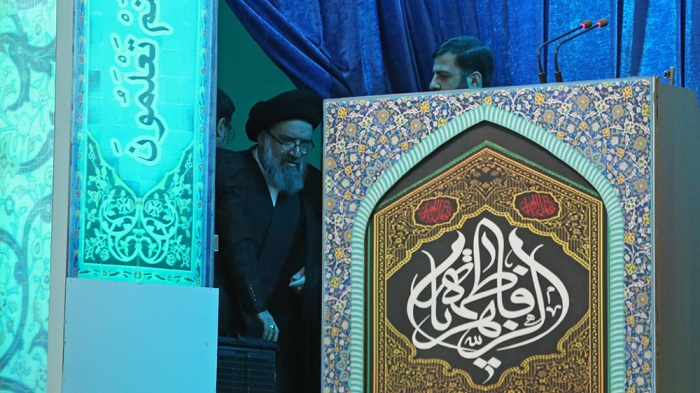Friday Prayers across Iran: No to bipolarization

(Tehran's Friday prayers leader Ahmad Khatami. Source: YJC)
This week, Friday prayers’ leaders across the country touched on a diverse range of topics, from a controversial bill passed by the parliament to cap public officials’ salary and caution about bipolarization on the verge of elections, to the weekly dose of Rouhani-bashing and criticism of his major diplomatic achievement, the nuclear deal or JCPOA.
In Tehran, Ahmad Khatami admonished Iranian political groups not to bipolarize the society before the upcoming elections slated for May 19th, 2017. “Elections in our country should be different from other countries,” Khatami said. “Regardless of which political wing wins the election, people’s outstanding turnout should be the priority” he noted. “The enemy is seeking turmoil through elections” the cleric warned, urging political parties not to desecrate Islamic values or question the Islamic Revolution’s achievements in the guise of electoral speech.
Hassan Rouhani’s recent speech in a meeting with banking officials, as usual full of biting remarks against critics of his policies and the nuclear deal, also raised strong protest among Friday prayers’ leaders.
In Mashhad, Ahmad Alamolhoda questioned why certain officials foster the process of bipolarization with their remarks. He indirectly accused Rouhani of retorting against Ayatollah Khamenei regarding the Supreme Leader’s remarks on JCPOA and criticism of Mahmoud Ahmadinejad’s administration. “If those people utter such remarks to mobilize a secular, anti-Supreme Leader group for the elections, they have betrayed the blood of martyrs [of the Revolution]” and helped bipolarization of the society, Alamolhoda said.
In Isfahan, Ayatollah Tabatabaeinejad also responded to Rouhani’s recent speech, particularly the president’s disparagement of ‘those who do not want to see people happy’, an allusion to staunch opposition to holding concerts across Iran by conservative clerics, a no-problem before Rouhani’s presidency. “We should know the correct meaning of happiness first” said Isfahan Friday prayers’ leader. “Holding concerts … is not happiness” Tabatabaei reminded. “If someone is happy but has empty pockets, their happiness has no use.”
In Shiraz, Assadollah Imani questioned the parliament’s recent decision to set a salary cap for governmental officials. The 24 million toman limit, 30 times the minimum wage, has raised protests, mostly among the Principlist camp who argue it legalizes income gap between different groups.
Regional developments, an essential part of sermons given in the Friday prayers, were also addressed by the leaders of the ritual. In Tehran, Ahmad Khatami spoke of Iranophobia, a term that in his words “has gained currency since the new US president has come to power”. Arguing that Iranophobia aims to offset Tehran’s peace-oriented power in the region, Khatami addressed the neighbors, stating that “a powerful Iran seeks stability in your countries, but Westerners, particularly the Americans, intend to disintegrate your countries”
“If it wasn’t for Iran, Daesh would form a state in Iraq, Syria and Lebanon” he said. Ahmad Khatami asked Iran’s neighbors to “appreciate [their] powerful brother and do not trust the West.”
“Iran is the [only] country … that has thwarted realization of US’ plans in the Middle East and Israel’s ambitions” said Shiraz Friday prayers’ leader Assadollah Imani. “Naturally, United States has plans to overcome this barrier. The US wants to convert Iran from a revolutionary country into a so-called ‘normal’ country” he said, adding that Washington is now pursuing this goal through stoking sectarian strife between Sunni and Shia.

